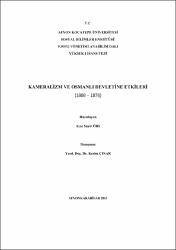Kameralizm ve Osmanlı Devletine Etkileri(1808 - 1876)
Özet
Orta Çağ’da Kilise’nin siyasal yönetim üzerinde hakim bir etkisi vardı, Rönesans ve Reform hareketlerinin etkisiyle Kilise’nin mutlak otoritesi sarsılmış siyasi otorite üzerindeki baskısı kalkmıştır. Ülke zenginliğinin dışarı aktarılmaması ve ekonomik faaliyeti ülkesel ölçeğe taşınması gerektiği anlayışına dayanan Merkantalizm, Kilise’nin hakim gücünün ortadan kalkmasıyla birlikte modern devletlere geçişi kolaylaştırmıştır. İngiltere’de ortaya çıkan Merkantalizm Almanya’da Kameralizm olarak uygulanmış ve dağınık halde bulunan Alman İmparatorluğu’nu siyasal anlamda birleştirmiştir.
Çalışmamızda, merkantalizm ve modern devletlerin ortaya çıkışı, Orta Çağ’da Alman İmparatorluğu’nun genel durumu, kameralizmin Almanya’da ve Osmanlı Devleti’nde meydana getirdiği değişiklikler incelenmeye çalışılmıştır. In the Middle Ages, the Church had a dominant effect over the political administration. With the effect of the Renaissance and Reform movements, the absolute authority of the Church was shaken, and its pressure over the political authority ended. In addition to the end of the dominant effect of the Church, the mercantilism which is based on the idea that the wealth of a country should not be transferred abroad, and its economic activities should be carried out within the borders of the country, facilitated the transition to the period of modern states. The mercantilism which emerged in England, was practised as Cameralism in Germany, and unified the German Empire politically which was in a scattered state.
In our study, mercantilism, the emergence of modern states, the general situation of the German Empire in the Middle Ages and the changes which Cameralism brought to Germany and Ottoman Empire will be examined.
Bağlantı
http://hdl.handle.net/11630/3393Koleksiyonlar
- Yüksek Lisans Tezleri [2074]



















